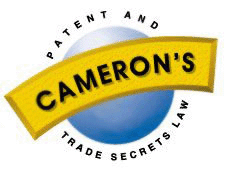
Henriksen v.
Tallon Limited
citation(s): [1965] R.P.C. 434
 |
Henriksen v.
|
copyright 1997 Donald M. Cameron, Aird & Berlis
At p. 441
"The patentee is representing to the Crown in seeking the patent and telling the skilled addressee after its publication and if the skilled addressee follows his directions he will produce an instrument that is useful at least in the sense that it will work. He is entitled within fairly wide limits to leave it to the addressee to choose appropriate material from a class which he specifies if he makes it plain that the choice is left to the addressee."
At p. 443
"It is a general principle of construction that, where there is a choice between two meanings, one should if possible reject that meaning which leads to an absurd result."
At p. 446
"The patent must be fairly and reasonably construed and words must be given a natural and not a strained meaning."
At p. 447
"I consider that the present case differs from Norton & Gregory Ltd. v. Jacobs (1937) 54 R.P.C. 271. In that case it was held that the claims, when construed according to the ordinary meaning of the language, asserted that certain reducing agents could be used. In fact some of them are undesirable and ineffective for producing the result sought. It was held that an attack upon the validity of the claim could not be countered by saying that skilled chemist would know that in the case of some of the reducing agents the assertion that they were suitable was untrue and by saying that in the case of the others a skilled chemist would ascertain whether they were effective. The claim was bad for inutility and it was held that the claim could not be construed so as to exclude any reducing agent which a chemist of ordinary skill would know, with or without experiment, to be unsuitable."
Return to:
Cameron's IT Law: Home Page; Index
Cameron's Canadian Patent & Trade Secrets Law: Home Page; Index